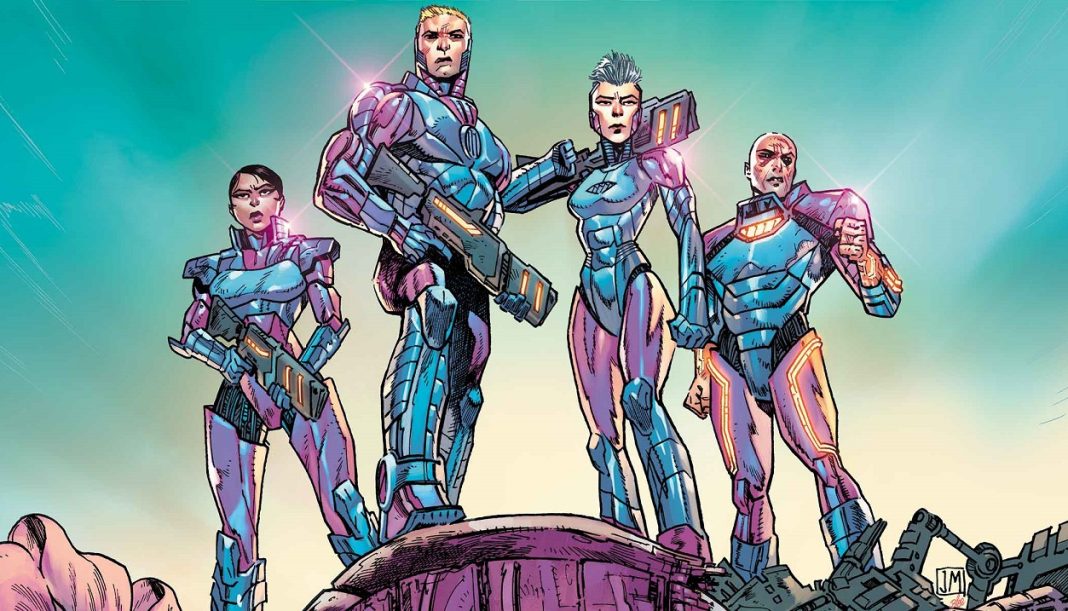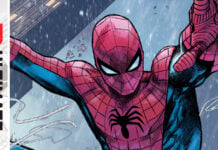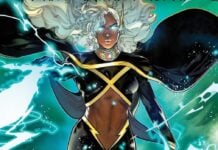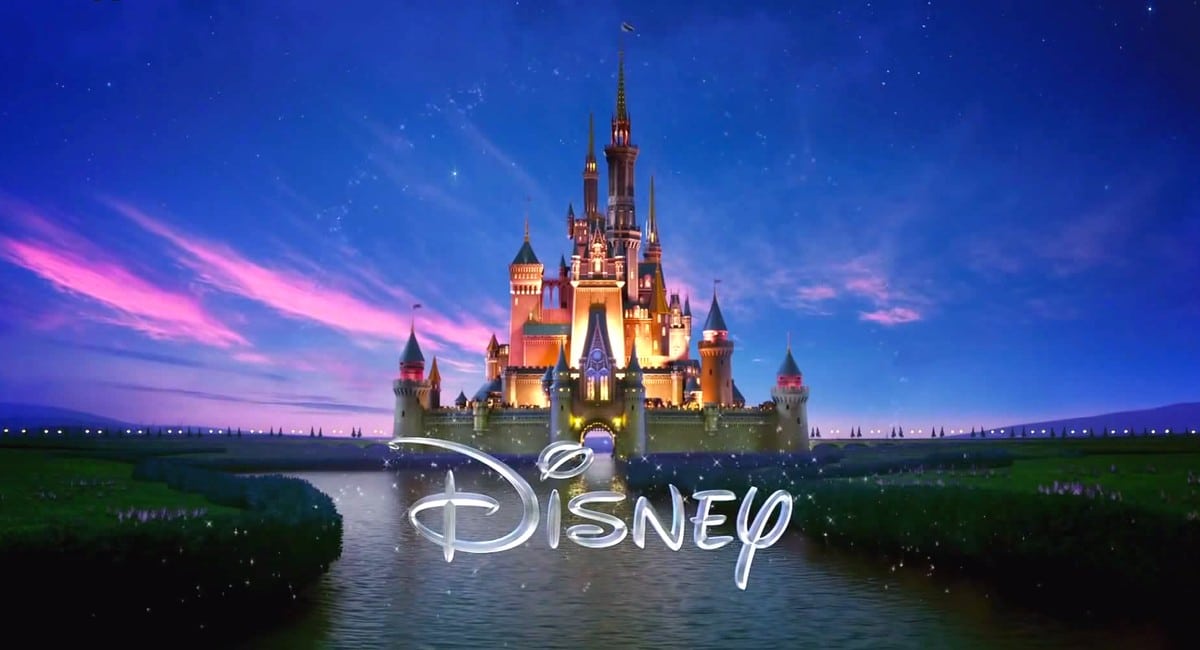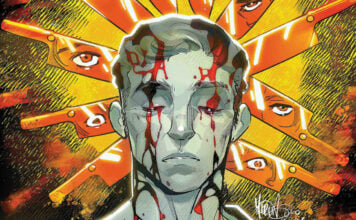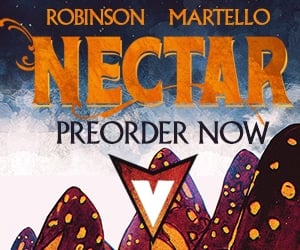Launching in October as part of Marvel Comics‘ ‘From the Ashes‘ relaunch of X-Men titles, Alex Paknadel and Justin Mason‘s Sentinels miniseries sees a new take on the famous X-Men threats. It’s bold and exciting, challenging what people might expect from a book with a title like Sentinels, and has more layers than one might think. The Beat reached out to Paknadel with some questions, which you can read below.
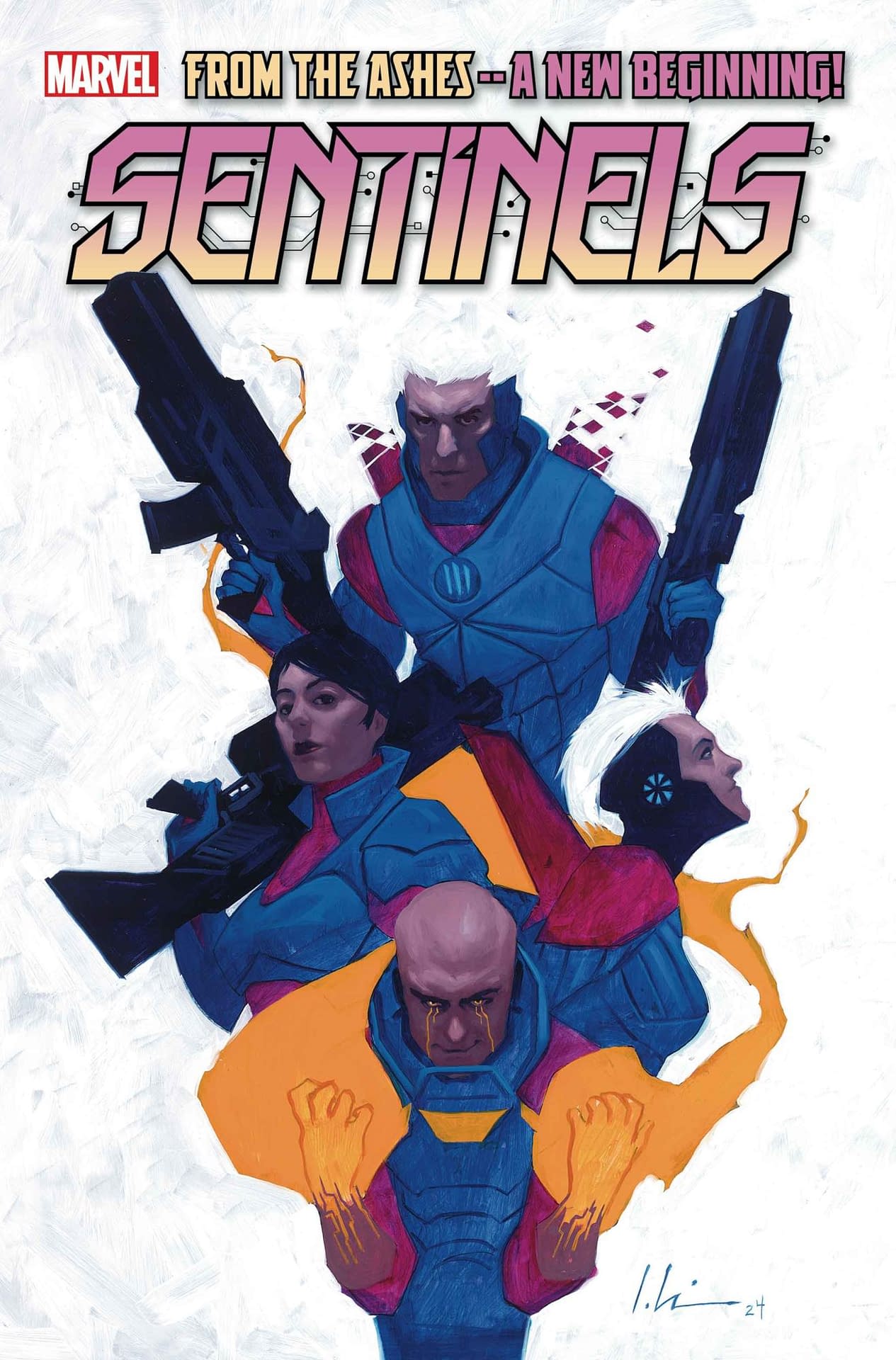
JARED BIRD: Hi Alex, thank you so much for your time today.
ALEX PAKNADEL: Thank you for having me!
BIRD: Your new book with Marvel, Sentinels, is coming out 9th October as part of the ‘From the Ashes’ relaunch of X-Men titles. What’s it like to work on the ‘From The Ashes’ relaunch?
PAKNADEL: Terrifying and exciting all at once. Terrifying in that we are following one hell of an act – everyone’s very aware of that, and respectful of that, but obviously Krakoa is going to cast a long shadow. I can only speak for myself, but I’ve been an X-Men fan for almost as long as I can remember. I got to do a little bit of X-Men Unlimited stuff during the Krakoan era, and it’s nice to be involved even peripherally, but when that came to an end I was kind of bummed. I thought ‘well, that was my shot!’. I heard it was being relaunched and I knew it was Tom Brevoort – I respect the hell out of Tom, and I’ve gotten really great and insightful notes from him before. I was on the phone with Christian Ward, who told me to drop Tom an email. I said ‘I can’t do that, it’s Tom Brevoort!’. Christian said ‘You work at Marvel! It’s okay!’. So I emailed him, wincing as I typed, and then to my astonishment I got an email back within an hour thanking me for reaching out. It could have ended right there and I would still have been on cloud nine, but then at NYCC last year, Darren Shan, an editor I had worked with on quite a few occasions prior, asked if I would like to work on some X-Men. This was it – the question I had been waiting literally decades for – and I was still wholly unprepared. Darren turned to me at one point and said ‘You’re quite excited about this aren’t you? Your knee is jiggling.’ My knee was up and down like a jackhammer! My face was totally cool and controlled but my knee was giving me away. So yeah, there’s a lot of trepidation, because we are following a deservedly beloved period, but a lot of excitement because well, it’s X-Men!
BIRD: I’ve also been an X-Men fan for forever too, as long as I’ve been reading comic books. As I’ve started doing more journalism, I’ve met so many wonderful creatives who’ve done work or gone on to do work on X-Men, and it feels quite daunting. It’s no longer ten degrees of separation, but like three.
PAKNADEL: It’s one of those unique gigs. I’ve done stuff before and it’s been well received, but I haven’t been in a situation before where thousands of people are passionately invested and scrutinizing every plot tidbit from the jump. I’m not sure I wouldn’t do the same position. It’s weird, and I’m doing it all from a little office in the north of England. Cosmetically everything out there is the same, but you’re stepping out into the world and thinking ‘Oh, this is quite a big deal, isn’t it?’
BIRD: What influenced your approach to Sentinels?
PAKNADEL: They came to me with the concept. There were a lot of very good ideas on the table already, but I was casting around for a tone. The tone I sort of hit on, and my editors were all in alignment with me on this, was early 2000s Wildstorm. Smart, politically astute, but very action oriented. Eye of the Storm stuff was the sweet spot. A lot of readers will know what I’m talking about straight away, but something like Strikeforce: Morituri as well. A bunch of 90’s X-Books too. Something that functions both as a superpowered fable but also has trenchant social commentary around the edges. I had the basic concept in hand and layered the tone over. I wanted to take those comic influences, and put them in a blender with the style of Paul Verhoeven. There’s a lot of Robocop and Starship Troopers. Hopefully on the other end of that is a nourishing meal.
BIRD: As soon as I saw the announcement, I picked up on the influence of Starship Troopers. A comic that had elements of satire and wasn’t going to play how you expected it to. What was it like working with artist Justin Mason?
PAKNADEL: Incredible. The two books under Darren Shan – Mystique by Declan Shalvey and Sentinels – are the sort of ‘scrappy’ corner. I don’t mean that as a term of opprobrium at all. The art and the writing in the main line titles is really slick and polished – every X-Men book I see is the smartest summer blockbuster you’ve ever seen, and you have beautiful art by people like David Marquez and Ryan Stegman. Justin has known Declan for a long time, and so we’ve been swapping notes. Justin has done some kinetic and visceral Spider-Punk stuff. It’s physical as well – when we get the pages through, you can see ink smudges and bleed. It’s beautifully intense. This will sound weird, but Mystique and Sentinels are the bootleg concert video of the X-Men lineup. We’re the scrappy corner where all the messed up stuff is happening.
BIRD: That is really exciting to me. Something I love about X-Books in general is the variety you can get. You can get a dark and intense book like X-Force, or something funny and heartwarming like Generation X. I’m glad the scrappy corner lives on.
PAKNADEL: I wrote a little afterword a the end of Sentinels #1, to reassure readers that the era of experimentation is not over – not by a long shot. The idea of a settled community becoming a diaspora again is filled with dramatic potential. Exiled from Eden. There’s a lot of real world analogs to it as well. The moment it became clear to me that we were engaging with the legacy of Krakoa, a singular trauma rippling through all of the books in the line, it all came into focus. It’s not a reestablishment of the status quo, it’s dealing with this as a profound disruption in global mutantdom. It was an exciting time to be an X-Men fan five years ago, and I firmly believe it’s an exciting time to be an X-Men fan now.
BIRD: I agree! It’s an exciting time for old fans and new. Was there a particular member of the Sentinels-crew that you enjoyed writing most?
PAKNADEL: I’ve picked two POV characters to follow. If you try to follow five characters across a five issue miniseries, the whole thing will collapse under the weight of itself, so you have to focus in somewhere. I have a character called Voivod, who’s not the focus, but he’s the one who doesn’t have the agenda the others have. He’s like a Greek chorus, pointing out to the others ‘well this is silly.’ He tends to undercut any pomposity when it comes along. When I start info dumping, or get too into the lore, his character will pull it back. I like that a lot.
BIRD: As a writer, I imagine it keeps you on the task at hand.
PAKNADEL: I think they’re all interesting characters as well. Obviously, I am acutely conscious of what the title evokes for a number of fans. Even as we were ramping up to show some preview pages, the ‘Remember It’ episode of X-Men 97 dropped. Going into it, I knew I had an opportunity to look at the banality of evil, however briefly. One of the things I wanted to put front and centre is that these characters don’t think of themselves as bigots. They’re doing a job. What they’re doing is wrong, emphatically wrong, but they punch out at the end of the day and forget it, until they can no longer ignore the reality of what they’re doing. I’ve tried to make the characters interesting, but it would be a stretch to make them sympathetic.
BIRD: That’s one of the most interesting things about the book for me. That’s a very real cognitive dissonance that people have. The human brain has an incredible ability to deny the truth even if it’s right in front of your very eyes. For so many people in life and in history have been on the ‘wrong’ side of the conflict and don’t particularly realise it.
PAKNADEL: The issue of complicity is an interesting one. Even down to the idea of no ethical consumption under capitalism. We all have to function in this world. I remember during the Occupy movement, right-wing rhetoric was to fault people for going and getting a coffee, because it made the movement ‘meaningless’. No, we have to live in this world, and there’s socioeconomic situations that prevail that we have to live under. The book is looking at the point where that all tips over. Once you realise, do you continue to be a machine, or do you go the other way?
BIRD: One of my favourite parts of the X-Men universe is the abundance of minor characters that have piled up over the years. Are there any minor X-Men characters you’d like to use in a comic in the future?
PAKNADEL: I’m going to hedge here, because if I refer to them as minor, someone’s going to get mad at me. For example, I don’t think of Maggott as a minor character at all. I asked to use him in a book and when it was announced, four people with Maggott profile pictures immediately contacted me. The tapestry of X is so rich, every supposedly minor character is always someone’s favourite so you have to treat them all with respect. That said, there are underutilized characters that I am using, absolutely. There are no minor characters, and I plan to use them exhaustively. It’s a very deep bench, and there are characters with five appearances who are just as cool as Wolverine.
BIRD: I’m so glad you mentioned Maggott, who’s from where I’m from! What do you hope fans take away from the series?
PAKNADEL: Principally, I hope they are entertained. I hope it operates well as a companion piece to Uncanny X-Men, because Sentinels takes place in Graymalkin Prison, so we’re sharing quite a few characters with Gail Simone and David Marquez’ book. In terms of existing in its own right, I hope it provides some interesting emotional context for the mutants’ homecoming. The thing that people might be missing is that this Sentinels program is run by a mutant, a resurrected Lawrence Trask, who designed the MK II Sentinels, but found out that he himself was a mutant, and has been living on Krakoa uncomfortably for quite some time. He has a position that he thinks is defensible. This Sentinels program is born out of his terror that humans and mutants will slaughter each other if thrown back into the mix with one another. In his mind, the Sentinels are there to protect humanity and mutants. Obviously, I don’t agree with that, but you are privy to a fascinating delusion that I am trying to explore as compellingly as I possibly can.
BIRD: If readers enjoy Sentinels, what other comics of yours should they check out?
PAKNADEL: If they’re Marvel inclined, last year I did a run on Red Goblin that I loved writing. Normie Osborn, the son of Harry Osborn and Liz Allen, who has his own symbiote who he feeds chocolate to and calls Rascal because he can’t face that it’s probably got less than great intentions. In terms of creator-owned work, I did a series with Caspar Wijngaard last year called All Against All, which I think might be the best thing I’ve ever done. I’m immensely proud of it anyways. It’s a science fiction take on parenthood and the dark thoughts you entertain as a parent. It’s not a cheery read but it’s a good one. Thanks to lovely Si Spurrier, DC have had me on to do some Barry Allen stories in the last few years. There was a Knight Terrors two-parter that I did, and I recently did Task Force VII #5 as part of the Absolute Power crossover, which I’m very proud of. Pete Woods drew the living hell out of that, so if for nothing else read it for Pete Woods’ artwork.
BIRD: Have a nice day.
PAKNADEL: You too!


